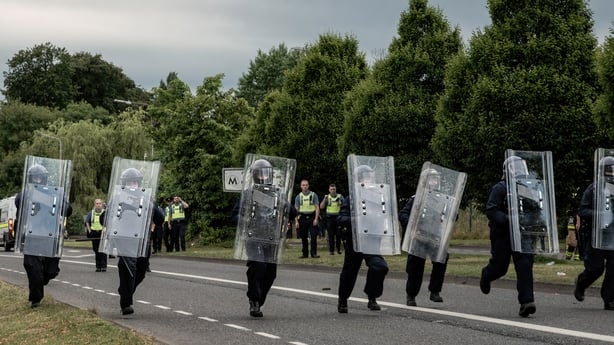The Garda Commissioner has admitted that "it was far from perfect" that uniformed gardaí with no protective equipment found themselves on the frontline at the riots in Coolock in Dublin last week.
Drew Harris told the Policing Authority that the unarmed gardaí showed great courage as they were subject to violence and abuse but they kept the situation from escalating last Monday week until the Public Order Unit arrived.
Assistant Commissioner Angela Willis, who is in charge of policing Dublin, described the investigation as a slow and laborious process. 34 people have been arrested and 26 have been charged with 46 offences, while there have been eight juvenile and adult cautions.
She said a total of 59 incidents are being investigated, including criminal damage, arson, public order offences and four assaults on gardaí.
Ten gardaí have been assigned to view 3,000 hours of CCTV which the Assistant Commissioner described as a "very cumbersome manual trawl".
She said it has taken 110 hours to watch 68 hours of footage while trying to identify suspects and evidence, "ruling some in and some out".
Mr Harris told the authority that gardaí need further legislation to use software to allow them to make digital identification of suspects and objects.

He said it was the only way to do this, "using gardaí to do this is hugely time consuming".
Mr Harris said it will not be possible for gardaí to view all 21,000 hours of CCTV gathered as part of the investigation into the riots in Dublin city centre last November.
He also said that gardaí were being threatened online. "Unsavoury things were being said about individual gardaí online" and these were under investigation.
The Commissioner once again rejected suggestions that it took too long to deploy the Public Order Unit last week.
He said some were nearby at Coolock Garda Station within two hours and could have deployed earlier.
Mr Harris also said the issue of protective equipment and headgear to uniformed gardaí "is one we have to consider carefully, its something we'll have to examine carefully".
He said "bump caps" had been issued on a pilot basis but had proved very unpopular with gardaí and they are working to change it to a baseball type of cap.
He said he would be "reticent" to support a full-time Public Order Unit to be available because he said part of An Garda Síochána's strength was its community connection.
Mr Harris said there was a danger that such a unit could become "a lightning rod around the nature of policing service".
"One of our great strengths is to engage and diffuse," Drew Harris said, "not rachet up with displays of force," he said.
Mr Harris also said there are lessons that can be learned by other organisations and departments because the worries and concerns in a local community about an accommodation centre can be resolved by communication and dialogue.
Disorder, he said, is not inevitable but it is regrettable it seems to be a greater reoccurrence.
Sometimes he said gardaí are presented with "his is what's happening" and given recent events, the policing operation and An Garda Síochána’s ability to resource it has to be considered, he said.
So far this year there have been 300 protests around the country in connection with International Protection Accommodation centres, 78 of those have been in Dublin.






